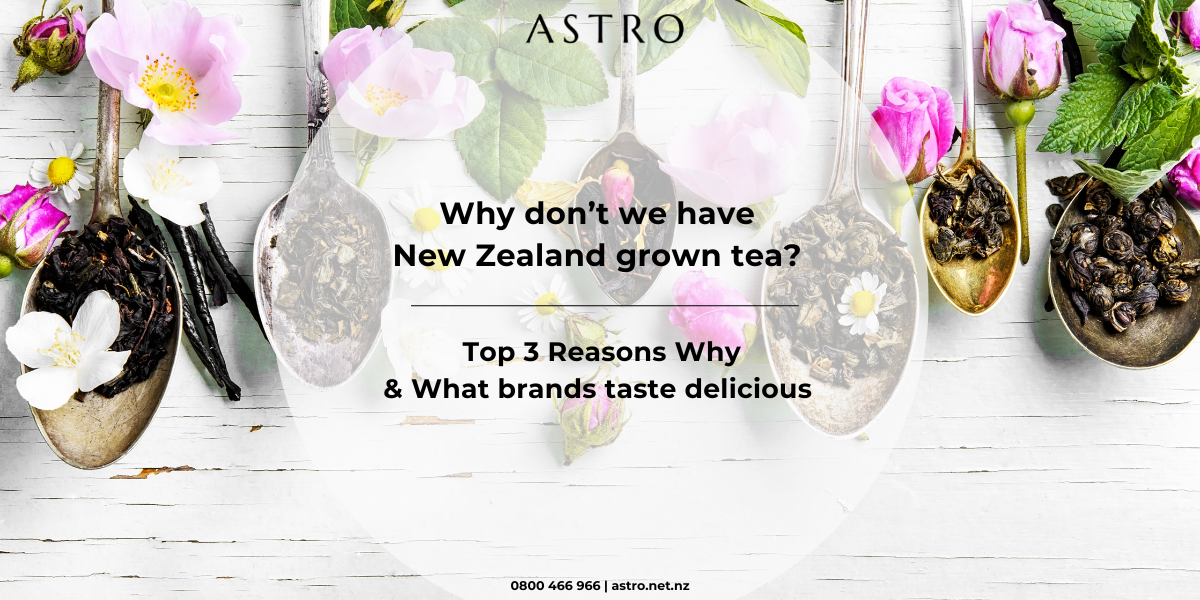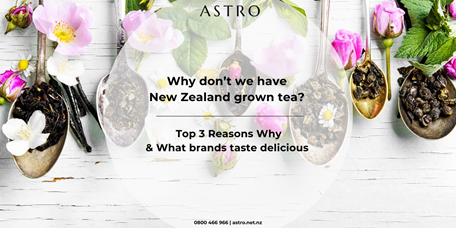Sabrina is a seasoned digital marketing manager with 10+ years of B2B & B2C experience in the tech and SaaS space. She is focused on building and implementing strategies that innovate, create awareness, and generate demand. Sabrina executes brand/product development through strategic alignment, passion, resolute focus, and inspired teams.
Chanui Tea vs Dilmah Tea - What is the best range for me?

As a Hotelier or Motelier, you’re most likely familiar with the Chanui and Dilmah Tea Ranges, but you may not know what the key differences are. When talking with our customers we often get asked, “What is the best tea range for me?”
The tea you put in your rooms is an important part of creating a superior guest experience and should be considered wisely. To help you decide which range is best suited for your property, we have an unbiased comparison of these two popular brands below, and you can Contact Us to discuss your needs.
Chanui:
Advantages:
- New Zealand Owned & Operated
- Sustainable Packaging
- Good Visual Impact
- Complimentary Tea Tray
- Cost-Effective
- New Zealand Owned & Operated:
Chanui is a New Zealand-owned and operated company. Nowadays, supporting local brands and buying from local businesses is becoming more of a guest expectation. Showing you support local is not only something you can be proud of but is also a great story you can share. - Sustainable Packaging:
Because global consumerism is focused on achieving environmental changes implementing practices that support sustainability will benefit your business. Chanui has joined the movement to become more sustainable and in doing so they are moving to paper-based packaging and away from the foil-wrapped packaging they once had. With more and more of your guests becoming eco-conscious they will appreciate this and realise you are doing your bit to make your property more socially responsible.
- Good Visual Impact:
First impressions matter! The first impressions your guests form about your rooms can determine how they remember their stay. One of the most immediately noticeable elements in your room, aside from the bed, is the refreshment bar area and the products you offer. Yes, something as small as a sleek, modern tea range complemented with a display tray can make all the difference. Chanui’s elegant black packaging emanates luxury and can elevate the aesthetic of your room.
- Complimentary Tea Tray:
When purchasing Chanui you can opt to receive a complimentary Chanui branded tea tray. Tea trays offer the ultimate in stylish presentation and are a great way to make the refreshment area in your guest room look tidy and sleek. Also, since you get the tray for free that’s one less cost you have to worry about for your property.
- Cost-Effective:
Chanui is imported directly from the overseas tea growers and packers to the owner’s New Zealand distribution centre. Since there are fewer steps in the supply chain this ensures the costs are kept to a minimum, which ultimately makes it a very cost-effective option for your hotel.
Disadvantages:
- Not Internationally Recognised
- Not Compostable
- Smaller Tea Range
- Doesn’t have a Food & Beverage Range
- Not Internationally Recognised:
When building your brand, having guest awareness is good and familiarity is better. Guests must first be familiar with a brand in order to appreciate the value of that product. Chanui isn’t internationally recognised which means your overseas guests may not have a relationship with the tea. This can affect their perception of the Chanui brand compared to that of a well-known global tea manufacturer. - Not Compostable:
Composting is an environmental benefit that helps divert waste from landfills and reduces greenhouse gas emissions. Chanui teabags contain plastic which means they cannot be composted. In the current market, there are other teabag options available, such as Pukka, that are fully compostable and are viewed as a more sustainable option. This could affect the perception your eco-conscious guests have about your business. - Smaller Tea Range:
Although Chanui has the most popular teas such as English Breakfast, Special Reserve and Earl Grey their herbal tea range is limited. What does this mean for your hotel guests? Their favourites may not be available. With brands like T2 or Pukka, there is a much wider range to offer. - Doesn’t have a Food & Beverage Range:
You may be like some hotel operators and prefer having one brand that covers your food and beverage needs - A brand that can cross over from your guest rooms to your restaurant. Chanui only offers tea that is individually wrapped, not a bulk loose-leaf range which is predominately used in the bistro. This also restricts your hotel from having a Chanui-branded high tea where your guests could pair the brew with an exquisite range of pastries and handcrafted sweets.
Dilmah:
Advantages:
- Well Respected & Recognised Brand
- Larger Range of Tea Flavours
- Have A Food & Beverage Range
- Well-Respected & Recognised Brand:
Some guests like to drink well-recognised brands. Having a tea brand in your hotel room that is respected and globally recognised gives your international travellers something they know, love and are familiar with. Well-known brands can prompt memories of great times with family and friends and can command brand loyalty. Dilmah’s tea range is an international favourite and is loved by many. - Wide Range of Tea Flavours:
Dilmah has a huge selection of tea flavours to tantalise your guest’s tastebuds. Having a diverse range enables you to easily change up your tea selection, cater to all, and offer something special for your guests to try, rather than the standard “every day” ranges many hotels and motels provide. - Have a Food & Beverages Range:
Dilmah has a great range of teas suitable for your restaurant including, loose leaf tea, pyramid tea bags or even iced tea.
Having a consistent brand that can be carried from your guest rooms through to your restaurant, means your visitors will have a great experience throughout your entire property.
Disadvantages:
- Unsustainable Packaging
- Foreign Ownership
- Traditional Packaging Design
- Common in a lot of Properties – Less Point of Difference
- Unsustainable Packaging:
Over the years you may have noticed that consumerism has evolved to create a culture in which your guests lean towards environmentally friendly products. Dilmah tea packaging is foil-wrapped which means there is a lot of waste created because the bags aren’t biodegradable, compostable or recyclable. Offering unsustainable products could be viewed negatively by your guests and lower their experience while staying at your hotel or motel. - Foreign Ownership:
Located in Sri Lanka, Dilmah is a foreign-controlled corporation. As a company that operates outside of New Zealand, the profits are not reinvested back into our economy but spent overseas. Additionally, since Dilmah is supplied into New Zealand the orders can be affected by global demand and delayed shipping, something you don’t get with a local brand. - Traditional Packaging Design:
Similar to how your clothes may become outdated or your appliances obsolete over time, the same thing happens with packaging design trends. Dilmah’s packaging has a very traditional look which can sometimes be viewed as unappealing in an era where guests want hip, sleek and modern guest room amenities. - Common In A Lot Of Properties:
Dilmah Tea is found throughout the world in many hotels, motels, boutique accommodations, and can even be bought at the supermarket. Having a range that is so readily available and in so many properties means your guests won’t have a unique tea experience while staying with you. It also means your point of difference won’t be as strong.
Would you like to experience the tea yourself? To help you make the right choice, we would love to send you samples, simply contact us today.


